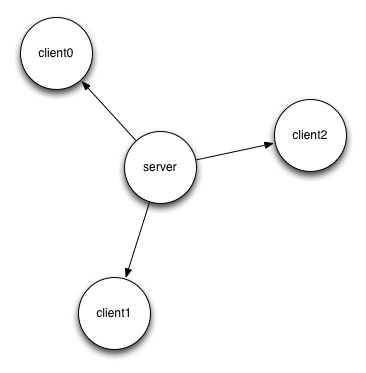| This document is derived from an original post by Tim Dysinger. That post is no longer available, but we have modified and restructured it, as well as making enhancments and corrections. Tim’s original code is on github, but we recommend using the examples here as they have a number of corrections. |
| If you want to use the experimental nng library instead, see the document Getting Started with 'nng'. |
Pub/Sub (Topics & Broadcast)

This pattern is used to allow a single broadcaster to publish messages to many subscribers, which may choose to limit which messages they receive.
pubsub.c
#include <stdlib.h>
#include <stdio.h>
#include <string.h>
#include <time.h>
#include <unistd.h>
#include <nanomsg/nn.h>
#include <nanomsg/pubsub.h>
#define SERVER "server"
#define CLIENT "client"
void
fatal(const char *func)
{
fprintf(stderr, "%s: %s\n", func, nn_strerror(nn_errno()));
}
char *
date(void)
{
time_t now = time(&now);
struct tm *info = localtime(&now);
char *text = asctime(info);
text[strlen(text)-1] = '\0'; // remove '\n'
return (text);
}
int
server(const char *url)
{
int sock;
if ((sock = nn_socket(AF_SP, NN_PUB)) < 0) {
fatal("nn_socket");
}
if (nn_bind(sock, url) < 0) {
fatal("nn_bind");
}
for (;;) {
char *d = date();
int sz_d = strlen(d) + 1; // '\0' too
printf("SERVER: PUBLISHING DATE %s\n", d);
int bytes = nn_send(sock, d, sz_d, 0);
if (bytes < 0) {
fatal("nn_send");
}
sleep(1);
}
}
int
client(const char *url, const char *name)
{
int sock;
if ((sock = nn_socket(AF_SP, NN_SUB)) < 0) {
fatal("nn_socket");
}
// subscribe to everything ("" means all topics)
if (nn_setsockopt(sock, NN_SUB, NN_SUB_SUBSCRIBE, "", 0) < 0) {
fatal("nn_setsockopt");
}
if (nn_connect(sock, url) < 0) {
fatal("nn_connet");
}
for (;;) {
char *buf = NULL;
int bytes = nn_recv(sock, &buf, NN_MSG, 0);
if (bytes < 0) {
fatal("nn_recv");
}
printf("CLIENT (%s): RECEIVED %s\n", name, buf); (1)
nn_freemsg(buf);
}
}
int
main(const int argc, const char **argv)
{
if ((argc >= 2) && (strcmp(SERVER, argv[1]) == 0))
return (server(argv[2]));
if ((argc >= 3) && (strcmp(CLIENT, argv[1]) == 0))
return (client (argv[2], argv[3]));
fprintf(stderr, "Usage: pubsub %s|%s <URL> <ARG> ...\n",
SERVER, CLIENT);
return 1;
}| 1 | Blithely assumes message is ASCIIZ string. Real code should check it. |
Compilation
gcc pubsub.c -lnanomsg -o pubsubExecution
./pubsub server ipc:///tmp/pubsub.ipc & server=$! && sleep 1
./pubsub client ipc:///tmp/pubsub.ipc client0 & client0=$!
./pubsub client ipc:///tmp/pubsub.ipc client1 & client1=$!
./pubsub client ipc:///tmp/pubsub.ipc client2 & client2=$!
sleep 5
kill $server $client0 $client1 $client2Output
SERVER: PUBLISHING DATE Sat Sep 7 17:40:11 2013 SERVER: PUBLISHING DATE Sat Sep 7 17:40:12 2013 SERVER: PUBLISHING DATE Sat Sep 7 17:40:13 2013 CLIENT (client2): RECEIVED Sat Sep 7 17:40:13 2013 CLIENT (client0): RECEIVED Sat Sep 7 17:40:13 2013 CLIENT (client1): RECEIVED Sat Sep 7 17:40:13 2013 SERVER: PUBLISHING DATE Sat Sep 7 17:40:14 2013 CLIENT (client2): RECEIVED Sat Sep 7 17:40:14 2013 CLIENT (client1): RECEIVED Sat Sep 7 17:40:14 2013 CLIENT (client0): RECEIVED Sat Sep 7 17:40:14 2013 SERVER: PUBLISHING DATE Sat Sep 7 17:40:15 2013 CLIENT (client1): RECEIVED Sat Sep 7 17:40:15 2013 CLIENT (client2): RECEIVED Sat Sep 7 17:40:15 2013 CLIENT (client0): RECEIVED Sat Sep 7 17:40:15 2013 SERVER: PUBLISHING DATE Sat Sep 7 17:40:16 2013 CLIENT (client1): RECEIVED Sat Sep 7 17:40:16 2013 CLIENT (client2): RECEIVED Sat Sep 7 17:40:16 2013 CLIENT (client0): RECEIVED Sat Sep 7 17:40:16 2013
